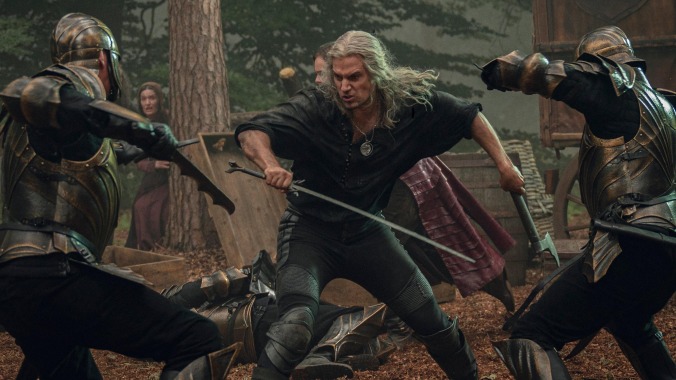The Witcher season 3, volume 2 review: Henry Cavill deserves a better exit
In the star's final episodes on the Netflix series, Geralt contemplates something that's been obvious from the start

Late in The Witcher’s third season, the second volume of which premieres July 27 on Netflix, Geralt (Henry Cavill) is having a reckoning. “I’ve always tried to stay above the fray,” he says. “To shut everything out. And life always finds a way to force my hand.” He flashes back to Renfri, the princess he killed back in season one—or the cursed child born under a bad moon, as the sorcerer Stregobor saw her.
Geralt never really believed Stregobor, but he didn’t have to; he was still clinging to his neutrality then, still trying to convince himself that staying out of it—the politics, the petty squabbles between men, the greater good or lesser evil, all of it—was the best way to stay alive. He kept telling himself this, and Ciri, too, decades later, all the way through the first volume of season three. He kept telling himself this right up until Dijkstra held a knife to his throat and told him, “You should’ve picked a side. The Redanian side.”
That’s where volume one ended, and where volume two picks up, in the middle of the Thanedd coup at Aretuza. In episode six, the first of three entries in volume two, both Vilgefortz and the Nilfgaardians and Dijkstra, Philippa, and the Redanians are trying to take over the magical school at the same time, and Geralt, Yenn, Jaskier, and Ciri are caught in the middle. Nearly all of the other mages have secretly chosen a side, and as the battle plays out, Geralt once again refuses to join either one. Instead, he focuses on getting Ciri out of there, away from all the people who want to use her. It’s a wonderfully tense, violent episode, a beautifully rendered explosion of pressure. And it’s where the season should have ended. Instead, the last two episodes drag on, leading to an anticlimactic—and even worse, boring—end for Henry Cavill’s time on the show.
When Cavill announced he’d be leaving after season three, many people assumed the show would end, too. He was, and is, the perfect person to play the mutant monster hunter; he’s an avowed fan of the novels and games on which the show is based, and he’s got the look, the grunts, and the “Ah, fuck”s down pat. He’s probably a bigger Witcher nerd than most people who watch the show. (Rumors claim that he left the series because it diverged too far from the books, but there’s no real evidence to back that up.)
So the decision to recast Geralt for season four—Liam Hemsworth will take over the role—was met with confusion at best and derision at worst. Since then, showrunner Lauren Schmidt Hissrich and executive producers Steve Gaub and Tomek Baginski have been trying to hype up both the transition and Cavill’s exit.
To be clear, the Geralt switch won’t happen until season four; season three was already done by the time Cavill announced he was leaving. The best they could do was try to give him something of a heroic sendoff, but that’s hard to do without killing the character completely. Even with those difficult constraints of saying goodbye to an actor without saying goodbye to their character, volume two still leaves you with a sense that Cavill deserved better than this.
Yes, Geralt gets a big final fight scene, but it feels oddly toothless. The characters he’s fighting are unimportant, and the choreography, while good, isn’t exceptional. And it stands out even more because of the direct parallels it draws to the Blaviken fight from the show’s very first episode, arguably the best in the whole series.
Ciri, meanwhile, joins up with the Rats and leans into her darker side while dodging her pursuers. It’s an interesting storyline that’s poorly executed; an entire episode is dedicated to Ciri wandering a desert, experiencing hallucinations and fighting to survive. But the sameness of the landscape makes for an exceptionally dull entry, and it’s hard not to think that at least half of it could’ve been cut. Geralt and Ciri have spent a good portion of the show separated, but their stories were woven together much more deftly in the past. This time, the series can’t find the right balance to keep things engaging.
In season one, Geralt walked away from Blaviken even more convinced that he should remain neutral. He took Renfri’s brooch as a reminder of what happens when you get involved: You get a whole lot of fear and resentment and a nickname you’d rather not have.
Geralt’s final fight in season three is meant to show his evolution, that he’s done with neutrality, that he’s ready to go to war with Nilfgaard, or whomever else, to protect Ciri. But, as Geralt himself admits, it’s not really that much of a change. He’s never been able to stay out of it, so he’s finally giving himself permission to get involved. Three seasons into The Witcher, we’re almost exactly back where we started, except this time, Geralt’s finally running toward his destiny instead of away from it. It might be a revelation for Geralt, but it’s unfortunately nothing new for the audience.
The Witcher season 3, volume 2 premieres July 27 on Netflix